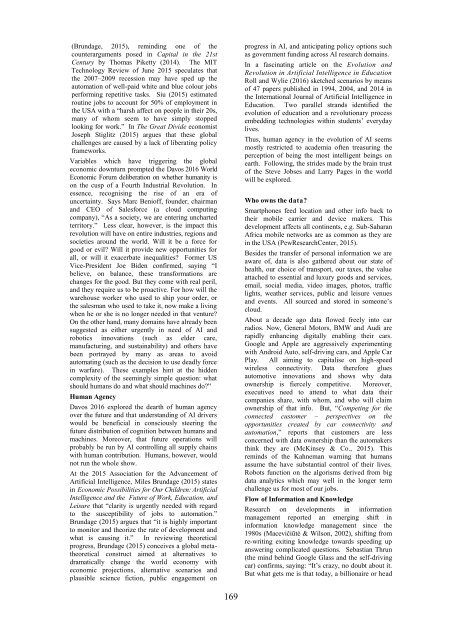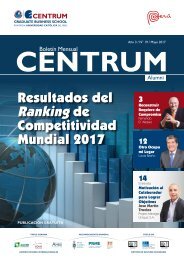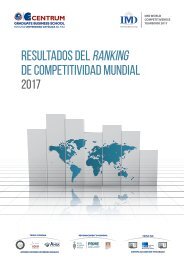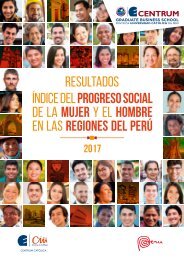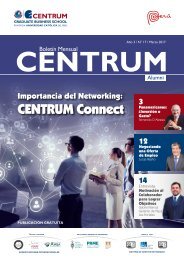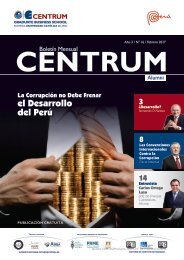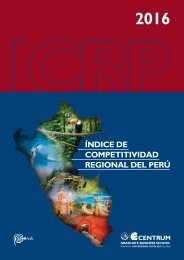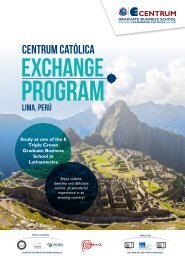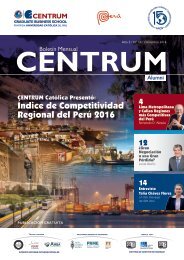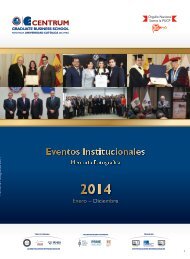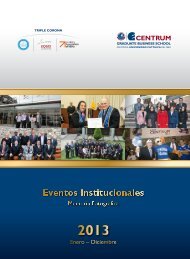Pan-Pacific Conference XXXIV. Designing New Business Models in Developing Economies
This publication represents the Proceedings of the 34th Annual Pan-Pacific Conference being held in Lima, Peru May 29-31, 2017. The Pan-Pacific Conference has served as an important forum for the exchange of ideas and information for promoting understanding and cooperation among the peoples of the world since 1984. Last year, we had a memorable conference in Miri, Malaysia, in cooperation with Curtin University Sarawak, under the theme of “Building a Smart Society through Innovation and Co-creation.” Professor Pauline Ho served as Chair of the Local Organizing Committee, with strong leadership support of Pro Vice-Chancellor Professor Jim Mienczakowski and Dean Jonathan Winterton.
This publication represents the Proceedings of the 34th Annual Pan-Pacific Conference being held in Lima, Peru May 29-31, 2017. The Pan-Pacific Conference has served as an important forum for the exchange of ideas and information for promoting understanding and cooperation among the peoples of the world since 1984. Last year, we had a memorable conference in Miri, Malaysia, in cooperation with Curtin University Sarawak, under the theme of “Building a Smart Society through Innovation and Co-creation.” Professor Pauline Ho served as Chair of the Local Organizing Committee, with strong leadership support of Pro Vice-Chancellor Professor Jim Mienczakowski and Dean Jonathan Winterton.
You also want an ePaper? Increase the reach of your titles
YUMPU automatically turns print PDFs into web optimized ePapers that Google loves.
(Brundage, 2015), rem<strong>in</strong>d<strong>in</strong>g one of the<br />
counterarguments posed <strong>in</strong> Capital <strong>in</strong> the 21st<br />
Century by Thomas Piketty (2014). The MIT<br />
Technology Review of June 2015 speculates that<br />
the 2007–2009 recession may have sped up the<br />
automation of well-paid white and blue colour jobs<br />
perform<strong>in</strong>g repetitive tasks. Siu (2015) estimated<br />
rout<strong>in</strong>e jobs to account for 50% of employment <strong>in</strong><br />
the USA with a “harsh affect on people <strong>in</strong> their 20s,<br />
many of whom seem to have simply stopped<br />
look<strong>in</strong>g for work.” In The Great Divide economist<br />
Joseph Stiglitz (2015) argues that these global<br />
challenges are caused by a lack of liberat<strong>in</strong>g policy<br />
frameworks.<br />
Variables which have trigger<strong>in</strong>g the global<br />
economic downturn prompted the Davos 2016 World<br />
Economic Forum deliberation on whether humanity is<br />
on the cusp of a Fourth Industrial Revolution. In<br />
essence, recognis<strong>in</strong>g the rise of an era of<br />
uncerta<strong>in</strong>ty. Says Marc Benioff, founder, chairman<br />
and CEO of Salesforce (a cloud comput<strong>in</strong>g<br />
company), “As a society, we are enter<strong>in</strong>g uncharted<br />
territory.” Less clear, however, is the impact this<br />
revolution will have on entire <strong>in</strong>dustries, regions and<br />
societies around the world. Will it be a force for<br />
good or evil? Will it provide new opportunities for<br />
all, or will it exacerbate <strong>in</strong>equalities? Former US<br />
Vice-President Joe Biden confirmed, say<strong>in</strong>g “I<br />
believe, on balance, these transformations are<br />
changes for the good. But they come with real peril,<br />
and they require us to be proactive. For how will the<br />
warehouse worker who used to ship your order, or<br />
the salesman who used to take it, now make a liv<strong>in</strong>g<br />
when he or she is no longer needed <strong>in</strong> that venture?<br />
On the other hand, many doma<strong>in</strong>s have already been<br />
suggested as either urgently <strong>in</strong> need of AI and<br />
robotics <strong>in</strong>novations (such as elder care,<br />
manufactur<strong>in</strong>g, and susta<strong>in</strong>ability) and others have<br />
been portrayed by many as areas to avoid<br />
automat<strong>in</strong>g (such as the decision to use deadly force<br />
<strong>in</strong> warfare). These examples h<strong>in</strong>t at the hidden<br />
complexity of the seem<strong>in</strong>gly simple question: what<br />
should humans do and what should mach<strong>in</strong>es do?”<br />
Human Agency<br />
Davos 2016 explored the dearth of human agency<br />
over the future and that understand<strong>in</strong>g of AI drivers<br />
would be beneficial <strong>in</strong> consciously steer<strong>in</strong>g the<br />
future distribution of cognition between humans and<br />
mach<strong>in</strong>es. Moreover, that future operations will<br />
probably be run by AI controll<strong>in</strong>g all supply cha<strong>in</strong>s<br />
with human contribution. Humans, however, would<br />
not run the whole show.<br />
At the 2015 Association for the Advancement of<br />
Artificial Intelligence, Miles Brundage (2015) states<br />
<strong>in</strong> Economic Possibilities for Our Children: Artificial<br />
Intelligence and the Future of Work, Education, and<br />
Leisure that “clarity is urgently needed with regard<br />
to the susceptibility of jobs to automation.”<br />
Brundage (2015) argues that “it is highly important<br />
to monitor and theorize the rate of development and<br />
what is caus<strong>in</strong>g it.” In review<strong>in</strong>g theoretical<br />
progress, Brundage (2015) conceives a global metatheoretical<br />
construct aimed at alternatives to<br />
dramatically change the world economy with<br />
economic projections, alternative scenarios and<br />
plausible science fiction, public engagement on<br />
progress <strong>in</strong> AI, and anticipat<strong>in</strong>g policy options such<br />
as government fund<strong>in</strong>g across AI research doma<strong>in</strong>s.<br />
In a fasc<strong>in</strong>at<strong>in</strong>g article on the Evolution and<br />
Revolution <strong>in</strong> Artificial Intelligence <strong>in</strong> Education<br />
Roll and Wylie (2016) sketched scenarios by means<br />
of 47 papers published <strong>in</strong> 1994, 2004, and 2014 <strong>in</strong><br />
the International Journal of Artificial Intelligence <strong>in</strong><br />
Education. Two parallel strands identified the<br />
evolution of education and a revolutionary process<br />
embedd<strong>in</strong>g technologies with<strong>in</strong> students’ everyday<br />
lives.<br />
Thus, human agency <strong>in</strong> the evolution of AI seems<br />
mostly restricted to academia often treasur<strong>in</strong>g the<br />
perception of be<strong>in</strong>g the most <strong>in</strong>telligent be<strong>in</strong>gs on<br />
earth. Follow<strong>in</strong>g, the strides made by the bra<strong>in</strong> trust<br />
of the Steve Jobses and Larry Pages <strong>in</strong> the world<br />
will be explored.<br />
Who owns the data?<br />
Smartphones feed location and other <strong>in</strong>fo back to<br />
their mobile carrier and device makers. This<br />
development affects all cont<strong>in</strong>ents, e.g. Sub-Saharan<br />
Africa mobile networks are as common as they are<br />
<strong>in</strong> the USA (PewResearchCenter, 2015).<br />
Besides the transfer of personal <strong>in</strong>formation we are<br />
aware of, data is also gathered about our state of<br />
health, our choice of transport, our taxes, the value<br />
attached to essential and luxury goods and services,<br />
email, social media, video images, photos, traffic<br />
lights, weather services, public and leisure venues<br />
and events. All sourced and stored <strong>in</strong> someone’s<br />
cloud.<br />
About a decade ago data flowed freely <strong>in</strong>to car<br />
radios. Now, General Motors, BMW and Audi are<br />
rapidly enhanc<strong>in</strong>g digitally enabl<strong>in</strong>g their cars.<br />
Google and Apple are aggressively experiment<strong>in</strong>g<br />
with Android Auto, self-driv<strong>in</strong>g cars, and Apple Car<br />
Play. All aim<strong>in</strong>g to capitalise on high-speed<br />
wireless connectivity. Data therefore glues<br />
automotive <strong>in</strong>novations and shows why data<br />
ownership is fiercely competitive. Moreover,<br />
executives need to attend to what data their<br />
companies share, with whom, and who will claim<br />
ownership of that <strong>in</strong>fo. But, “Compet<strong>in</strong>g for the<br />
connected customer – perspectives on the<br />
opportunities created by car connectivity and<br />
automation,” reports that customers are less<br />
concerned with data ownership than the automakers<br />
th<strong>in</strong>k they are (McK<strong>in</strong>sey & Co., 2015). This<br />
rem<strong>in</strong>ds of the Kahneman warn<strong>in</strong>g that humans<br />
assume the have substantial control of their lives.<br />
Robots function on the algorisms derived from big<br />
data analytics which may well <strong>in</strong> the longer term<br />
challenge us for most of our jobs.<br />
Flow of Information and Knowledge<br />
Research on developments <strong>in</strong> <strong>in</strong>formation<br />
management reported an emerg<strong>in</strong>g shift <strong>in</strong><br />
<strong>in</strong>formation knowledge management s<strong>in</strong>ce the<br />
1980s (Macevičiūtė & Wilson, 2002), shift<strong>in</strong>g from<br />
re-writ<strong>in</strong>g exit<strong>in</strong>g knowledge towards speed<strong>in</strong>g up<br />
answer<strong>in</strong>g complicated questions. Sebastian Thrun<br />
(the m<strong>in</strong>d beh<strong>in</strong>d Google Glass and the self-driv<strong>in</strong>g<br />
car) confirms, say<strong>in</strong>g: “It’s crazy, no doubt about it.<br />
But what gets me is that today, a billionaire or head<br />
169


